|
|
|
Sort Order |
|
|
|
Items / Page
|
|
|
|
|
|
|
| Srl | Item |
| 1 |
ID:
148055
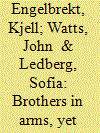

|
|
|
|
|
| Summary/Abstract |
2014–2015 were years of turmoil for strategic relations, with Sino-Russian relations emerging as a particularly interesting set of ties to observe. This article asks whether recurrent Sino-Russian exhortations of friendship are mirrored by their strategic alignment in the defence and security realm, half a century after the end of the Sino-Soviet pact during the communist era. We examine the arms trade between the two countries and with regional partners, but also the recent pattern of bilateral and multilateral military exercises, as a combined test of the security and defence relationship. We are able to show that the image of friendship that both Moscow and Beijing like to promote, while apparent at the UN Security Council and within the BRICS group, remains constrained by rivalry in high-tech segments of the arms industry and by lingering concerns about the prospects of peer interference in their shared regional vicinity.
|
|
|
|
|
|
|
|
|
|
|
|
|
|
|
|
| 2 |
ID:
148052
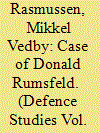

|
|
|
|
|
| Summary/Abstract |
Taking its point of departure in Donald Rumsfeld’s second term as US Secretary of Defense (2001–2006), this article analyses the crisis of strategic leadership in Western national security. Three “traps” are identified that explain why Donald Rumsfeld ultimately was a failure as defence secretary and demonstrate the perils of national security governance. These traps are termed the inquisitor trap, the strong leader trap and the delegation trap. It is argued that our understanding of strategic leadership in national security, particularly in defence, can benefit from insights gained from the study of strategic leadership in business. As such, this article engages the recent trend of merging insights from business and military strategy.
|
|
|
|
|
|
|
|
|
|
|
|
|
|
|
|
| 3 |
ID:
148050
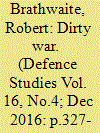

|
|
|
|
|
| Summary/Abstract |
The utilization of chemical weapons to quash domestic rebellion is a drastic action for a regime facing domestic challengers to take, especially given the reputation costs and risk of international intervention. However, recent developments have illustrated that some regimes have contemplated and implemented extraordinary measures (including the use of chemical munitions) to quash rebellion. This study addresses the question of why some states utilize chemical weapons against domestic challengers while others refrain from this level of state repression. I argue that the utilization of chemical weapons has both domestic and international elements. Specifically, that ethnic cleavages that lead to secessionist challenges and factors associated with inter-state rivalry impact the likelihood that a state utilizes the employment of chemical munitions. I test my argument and other explanations regarding repression with a casestudy approach utilizing captured Iraqi Government documents comparing Iraq’s Al-Anfal campaigns with developments during the recent Syrian Civil War.
|
|
|
|
|
|
|
|
|
|
|
|
|
|
|
|
| 4 |
ID:
148054


|
|
|
|
|
| Summary/Abstract |
This article provides a theorisation of militarism in post-war Cyprus. Based on qualitative empirical research conducted in Cyprus in 2011, the article explores the manifestation and steadfastness of Greek-Cypriot militarism, and the development of this militarism, which appeared after the partition of the island in 1974. In particular, it proposes the ideology of defence as a way to understand post-war Greek-Cypriot militarism. It shows the embedded nature of defence in the idea of the national struggle. It aims at mapping the character of this militarism in order to provide the grounds for future discussion. Only by understanding the interconnecting discourses that made Greek-Cypriot militarism possible in post-war Cyprus, can we understand its past, present, and future.
|
|
|
|
|
|
|
|
|
|
|
|
|
|
|
|
| 5 |
ID:
148053
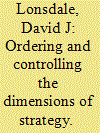

|
|
|
|
|
| Summary/Abstract |
Colin Gray’s dimensions of strategy, built upon the earlier work of Clausewitz and Howard, has theoretical, practical, and pedagogic value for the Strategic Studies community. This paper further develops the theory, arguing that the dimensions can be controlled or managed to improve strategic performance. The dimensions are divided into two categories: “internal” and “external” to the process of strategy. The paper describes the dynamic process by which the internal dimensions, which can be controlled, are used to exert influence over the external dimensions that are beyond the control of the strategist. It is argued that six dimensions hold the key to strategic success: politics and the five dimensions concerned with warfighting. This conclusion validates the Clausewitzian paradigm with its emphasis on policy and battle.
|
|
|
|
|
|
|
|
|
|
|
|
|
|
|
|
| 6 |
ID:
148051
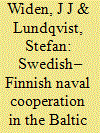

|
|
|
|
|
| Summary/Abstract |
Recently, Finland and Sweden decided to substantially deepen their defence cooperation and this project involves creating a bilateral standing Naval Task Group (SFNTG). The present article aims at examining the deepening naval cooperation between Finland and Sweden from a regional integration perspective, focusing on its motives, current challenges and future prospects. Driven by perceptions of common challenges and desires for cost-effectiveness, and strengthened by recent successes on sea surveillance and a combined Amphibious Task Unit, the bilateral project has considerable potential to achieve success. To fulfil its objectives, substantial legal changes in both countries are required to allow the use of force on each other’s territorial waters. To cater for the requirement of not conflicting with EU, NORDEFCO or NATO cooperations, the bilateral Task Group must operate according to NATO standards and by using English as the language in command and control. The costs of adjusting the naval units to NATO’s technical requirements are far from negligible and this issue still remains to be solved. If Finland and Sweden manage to incorporate new policies, common structures and common organisational norms among their navies, an even deeper integration, as in Belgium and the Netherlands, are conceivable.
|
|
|
|
|
|
|
|
|
|
|
|
|
|
|
|
|
|
|
|
|